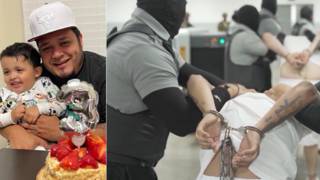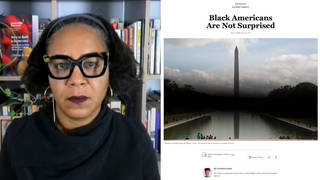
Guests
- Marisa Francodirector of Mijente, which helped organize the Wall Off Trump protest at the RNC last July.
- Linda Sarsourdirector of the first Muslim online organizing platform, MPower Change, and co-founder of the Muslim Democratic Club of New York.
- Nikole Hannah-Jonesaward-winning reporter covering racial injustice at The New York Times Magazine.
- Jose Antonio VargasPulitzer Prize-winning journalist and filmmaker. He famously came out of the shadows in 2011 in The New York Times Magazine with his story, “My Life as an Undocumented Immigrant.” He is founder and editor of #EmergingUS, founder of Define American, and producer and director of two documentary films, Documented and White People.
- John Nicholspolitical writer for The Nation and co-author with Robert McChesney of the book, People Get Ready: The Fight Against a Jobless Economy and a Citizenless Democracy.
In other campaign news from Arizona, Maricopa County Sheriff Joe Arpaio lost his bid for a seventh term. Arpaio faces the possibility of jail time, after federal prosecutors announced they are charging him with criminal contempt of court over his refusal to end unconstitutional immigration patrols in Arizona. Arpaio was a major supporter of Donald Trump. His policies have included racial profiling and detaining immigrants in a scorching outdoor tent city jail, which Arpaio once referred to as his own “concentration camp.” We go to Phoenix, where we are joined by Marisa Franco, director of Mijente, which helped organize the Wall Off Trump protest at the RNC last July.
Transcript
AMY GOODMAN: In other campaign news from Arizona, Maricopa County Sheriff Joe Arpaio lost his bid for a seventh term. Arpaio faces the possibility of jail time himself, after federal prosecutors announced they’re charging him with criminal contempt of court over his refusal to end unconstitutional immigration patrols in Arizona. Arpaio was a major supporter of Donald Trump. His policies have included racial profiling, detaining immigrants in a scorching outdoor tent city jail, which Arpaio once referred to as his own “concentration camp.”
We’re going now to Phoenix, where we’re joined by Marisa Franco. She’s the director of Mijente, which helped organize the Wall Off Trump protest at the Republican National Convention last July.
Welcome to Democracy Now! Marisa, can you talk about your overall response to the reaction? I mean, Donald Trump, you know, came into the consciousness of this whole country when he went down that escalator and made his announcement that he was running for president, and talked about Mexicans as rapists and criminals, and, of course, has made his mark by saying that he will build a wall on the Mexican-U.S. border and make Mexico pay for it.
MARISA FRANCO: You know, like so many across the country, Amy, we’re shocked. We’re utterly shocked at the results of this election. And waking up this morning, I couldn’t help but feeling like we woke up to a big, big red state in this country. And I think it leaves us with a lot to evaluate, many lessons to learn. I think that this is obviously a very different political moment, and what it requires from us is to be different political actors.
With that said, calling in and being based in Arizona and being from Arizona, some of us have already been living in red states. Some of us have already been living in Trump’s America. And I think that there’s a lot of things that people who have been living these experiences and living in these places can share and teach in this moment. I do think there is a way forward. As depressing and as shocked as we are, there are some of us who have been struggling in this reality, and this is now the reality in the country.
AMY GOODMAN: And can you talk about the defeat of Sheriff Arpaio? How long has he been in office?
MARISA FRANCO: He’s been in office for 23 years. And I’m happy to report that it was the very people that the sheriff denigrated and abused that led the effort to kick him out of office after 23 years. This is a—this is an effort that’s built on years of community organizing and direct action, that led to the sheriff’s legal problems. It was powered by a generation of organizers politicized after SB 1070. And it’s just been an amazing effort. We were obviously very excited to see the sheriff’s defeat. And, you know, we’re really holding the moment last night of feeling like, you know, this nightmare is over, but witnessing what was happening around the rest of the country, and equally shocked and horrified.
AMY GOODMAN: Well, let me ask, as we wrap up—we’re doing a two-hour special today, and people can see the other hour at democracynow.org, if your station isn’t running it directly right now. But the role of movements, not something that the media is very good at covering, grassroots movements? Because there is a force more powerful than even the most powerful person in the United States, perhaps even the world, and that is something that all of you have been involved with one way or the other. Let me start with Linda.
LINDA SARSOUR: I mean, one of the things that makes me horrified about a Trump administration is the continued use of codewords like “law and order.” And we know what that means. That means cracking down on political activists and political movements in this country, the fact that we have Rudy Giuliani who’s at the helm of being the next attorney general. So, we—this election is a response to us, Black Lives Matter, immigrant rights activists, DREAMers. Like, this is a response to us.
AMY GOODMAN: Black Lives Matter—didn’t Donald Trump say—didn’t his forces say that—Rudy Giuliani say, that they would be the first group investigated as terrorists in a Trump administration?
LINDA SARSOUR: That’s right.
AMY GOODMAN: The significance of this, Nikole Hannah-Jones?
NIKOLE HANNAH-JONES: I mean, I think that we have some very frightening times ahead of us. We know the role that the federal government has played in breaking up organizations that have been fighting for civil rights. We have a long, torrid history of that. And typically it’s not so blatantly stated. So, I think we should believe what Donald Trump has said. And I think that we already know the government has been spying on these organizations. And I think we’re going to see a lot more efforts—
AMY GOODMAN: That’s under President Obama.
LINDA SARSOUR: Exactly.
NIKOLE HANNAH-JONES: Yes, absolutely. So, I think that that should tell us something.
LINDA SARSOUR: My organization, too, under the NYPD.
AMY GOODMAN: Your organization—
LINDA SARSOUR: Here in New York City. We were in the AP reports that came out in 2011.
AMY GOODMAN: Being investigated by the FBI.
LINDA SARSOUR: Yeah, under unwarranted surveillance and secret documents.
AMY GOODMAN: Under President Obama. Jose Antonio Vargas?
JOSE ANTONIO VARGAS: I mean, one of my biggest worries here right now is what—the state of undocumented immigrants in this country, right? Kind of the mental trauma that is happening right now, as just mentioned a few minutes ago. Seven hundred and fifty thousand people is a lot of people. Right? And now the government has their names, their addresses—
AMY GOODMAN: And these are the people who—
JOSE ANTONIO VARGAS: These are the young people who were brought here as children—right?—who are now working in parts of our own communities. And the government has all of their information. So what happens when Donald Trump is president on day one?
AMY GOODMAN: Because it came out through a kind of executive order, executive action.
JOSE ANTONIO VARGAS: That he has said that he would take back.
AMY GOODMAN: Last words, John Nichols?
JOHN NICHOLS: Look, there are moral duties here. And we are talking about people who have been targeted. Let us be very, very clear. This administration will attack the trade union movement in this country. This organization—this administration will attack organizations with substantial numbers of white men in. And the fact of the matter is, our response to this ought to be massive. It ought to be in the streets. But it also ought to hold the Democratic Party to account. They have a filibuster power in the Senate. We have two Senate seats still unsettled.
AMY GOODMAN: Five seconds.
JOHN NICHOLS: And the simple reality is that that “no” must resonate in the streets and in Washington.
AMY GOODMAN: We just got a Twitter question: How can we restore the Voting Rights Act? We’ll leave it there. Marisa Franco, John Nichols, Linda Sarsour, Jose Antonio Vargas, Nikole Hannah-Jones, Wayne Barrett, thanks for joining us. This is Democracy Now! Check out our second hour at democracynow.org.












Media Options